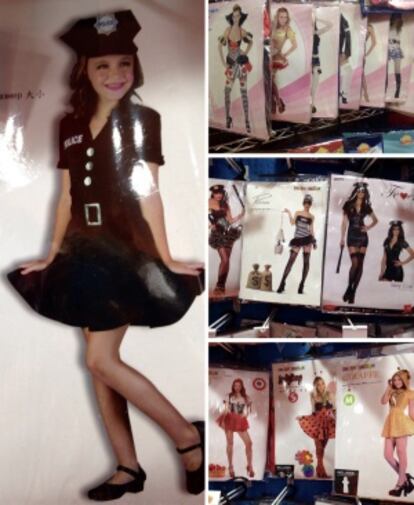Anger over “sexy” party costumes for young girls
Photo of provocative nurse’s outfit for four to six year olds shared on Facebook 7,000 times in one day
When it comes to costumes for Carnival or Halloween, there are two kinds: outfits such as doctors and pirates and vampires for men, and the “sexy versions” for women. Here is an example of what comes up in Google Images when we search for the same costumer according to gender:

But provocative party costumes are not confined to the adult market. The image of a sexy nurse outfit for girls aged four to six went viral on social networks at the start of February, after being posted on the Twitter feed of culture blog Hematocrítico and on the Cultura Re-Evolucionaria Facebook page.
Me acaban de enseñar en Facebook este Disfraz PARA NIÑAS. Atentos a los rangos de edad. pic.twitter.com/q0iGxYcJYb
— El Hematocrítico (@hematocritico) February 2, 2017
“I have just posted this costumer FOR GIRLS in Facebook. Take note of the age range.”
The photo of the costume was taken last year by Carolina Rodríguez. Infuriated when she came across the product in a discount store in Madrid she snapped a picture and posted it on Facebook. On January 22, Hematocrítico posted images of two other sexualized costumes for little girls – Disney princesses – and Rodríguez sent her image back by way of reply. Hematocrítico then posted Rodríguez’s photo on its social network sites, at which point it went viral.
Other people have run with the subject and shared pictures of sexualized costumes for girls on social media, including a female firefighter’s outfit from the same range as the nurse, a policewoman and a giraffe, which were published on the motherhood blog site El Laboratorio de Mamá.
A complex solution
The consumer association FACUA is now trying to find out who is responsible for the costumes. According to a spokesperson for the association, the policy in these cases is the same as in any type of publicity that is degrading to women. “If the message is sexist, it doesn’t matter if it’s an advert or a label,” the spokesperson says.
But even if FACUA finds the culprits, the association admits that if the company doesn’t want to play ball, there’s not much that can be done. “Consumer associations and women's rights associations can file a report and demand the withdrawal of the product or image,” he explains. “But the company can refuse because the petitions are don’t automatically lead to sanctions.”
Being a woman is not about wearing a costume and girls will have to choose an adult image when the time comes Women's rights group Tiemar
These demands can be effective against well-known companies who want to protect their image, but when it comes to low-profile operations, it is more complicated. “It depends entirely on how they react,” says FACUA.
Although the consumer association has no specific figures for complaints relating to these kinds of costumes, they do say that consumers regularly contact them with complaints of campaigns that vilify women. The problem is that there is no administrative body with the capacity to impose sanctions in these cases. “We need to clarify which authority is in charge of taking legal action,” says FACUA.
Beauty pageant controversy
While it is most common to see provocative costumes for girls in discount stores, talent shows and fairs are also fertile ground for this kind of sexualization. In the Arrecife Carnival in Lanzarote, the poster of a nine-year-old candidate for a child beauty pageant wearing makeup and baring a shoulder has come up for fierce criticism from the local feminist organization, Tiemar.

“Being a woman is not about wearing a costume and little girls will have to choose their appropriate adult image when the time comes without the heavy influence of sexist stereotypes,” the organization said in a statement published on Facebook.
The nine-year-old girl’s family has decided to withdraw the poster from social media, although the girl will still take part in the contest, according to regional news site La Provincia. “The make-up and costume are in keeping with the spirit of the carnival, a time when people get dressed up, which is why the matter need not go further,” the media outlet said at the time. Meanwhile, the mother of the girl told La Provincia that they would denounce Tiemar for undermining “the right of the little girl and of her parents to the respect they are due.”
But while a carnival outfit might seem harmless enough, a study by the American Association of Psychology, indicates that the sexualization of women is linked to food disorders, low self-esteem and depression. And from 2007 to 2015, the number of minors treated for food disorders in Spain rose 31%.
English version by Heather Galloway.
Tu suscripción se está usando en otro dispositivo
¿Quieres añadir otro usuario a tu suscripción?
Si continúas leyendo en este dispositivo, no se podrá leer en el otro.
FlechaTu suscripción se está usando en otro dispositivo y solo puedes acceder a EL PAÍS desde un dispositivo a la vez.
Si quieres compartir tu cuenta, cambia tu suscripción a la modalidad Premium, así podrás añadir otro usuario. Cada uno accederá con su propia cuenta de email, lo que os permitirá personalizar vuestra experiencia en EL PAÍS.
¿Tienes una suscripción de empresa? Accede aquí para contratar más cuentas.
En el caso de no saber quién está usando tu cuenta, te recomendamos cambiar tu contraseña aquí.
Si decides continuar compartiendo tu cuenta, este mensaje se mostrará en tu dispositivo y en el de la otra persona que está usando tu cuenta de forma indefinida, afectando a tu experiencia de lectura. Puedes consultar aquí los términos y condiciones de la suscripción digital.









































